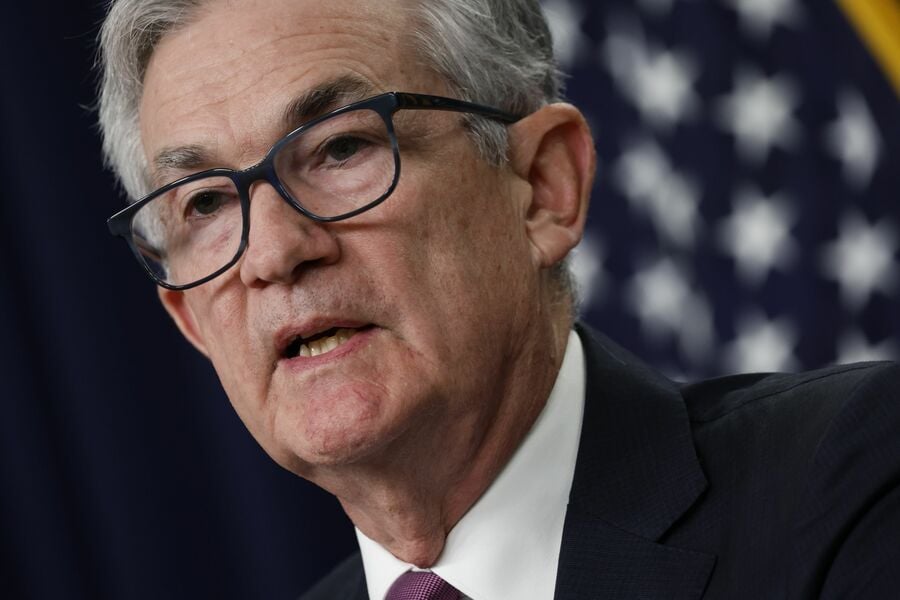

Federal Reserve Chair Jerome Powell said the central bank will lower interest rates “over time,” while again emphasizing that the overall US economy remains on solid footing.
Powell also reiterated his confidence that inflation will continue moving toward the Fed’s 2% target, adding that economic conditions “set the table” for a further easing of price pressures.
“Looking forward, if the economy evolves broadly as expected, policy will move over time toward a more neutral stance,” Powell said in a speech in Nashville at the annual meeting of the National Association for Business Economics. “But we are not on any preset course,” he said, noting that policymakers will continue to make decisions meeting by meeting based on incoming economic data.
A neutral policy is one that neither stimulates nor holds back the economy. The Fed’s current benchmark rate, which officials lowered to a range of 4.75%-5% earlier this month, is widely regarded as still restricting economic activity.
The remarks left open the question of how policymakers will approach the size and pace of interest-rate cuts in coming months, a crucial matter for investors.
In a Q&A session following his speech, the Fed chair acknowledged that projections issued by officials alongside their September rate decision point toward quarter-point rate cuts at the next two meetings, in November and December. But he cautioned that the Federal Open Market Committee will make its decisions based, in part, on information they haven’t yet received.
“This is not a committee that feels like it’s in a hurry to cut rates quickly,” Powell said. “Ultimately we will be guided by the incoming data. And if the economy slows more than we expect, then we can cut faster. If it slows less than we expect, we can cut slower.”
The central bank lowered borrowing costs by a half percentage point earlier in September, the first reduction since 2020 and a larger-than-usual move. Officials have described the outsize cut as one aimed at protecting a slowing labor market from further weakening.
Powell on Monday described the labor market as solid, but said conditions have “clearly cooled over the past year.”
“We do not believe that we need to see further cooling in labor market conditions to achieve 2% inflation,” he said.
Inflation has been tame in recent months, a trend reinforced by government data released last week showing the Fed’s preferred gauge of price pressures rose modestly in August. On a 12-month basis, the personal consumption expenditures price index climbed 2.2%.
That’s provided officials more confidence that inflation is moving toward their goal, allowing them to place a greater focus on shoring up the labor market.
“Disinflation has been broad based, and recent data indicate further progress toward a sustained return to 2%,” Powell said.
Still, some policymakers are wary of cutting rates too quickly and potentially reigniting inflationary pressures in the economy.
“Our goal all along has been to restore price stability without the kind of painful rise in unemployment that has frequently accompanied efforts to bring down high inflation,” Powell said. “While the task is not complete, we have made a good deal of progress toward that outcome.”
Powell acknowledged the decline in housing-related inflation has been sluggish, but expressed confidence that in time it would further taper.
At their meeting earlier this month, officials penciled in a half point of additional cuts for the remainder of 2024 and a further percentage point of reductions in 2025, according to the median projections. However, several officials estimated a smaller amount of easing through year’s end.
Investors are betting the Fed will lower rates by roughly another 75 basis points this year, according to futures markets, implying one more large cut in either November or December.
A handful of Fed officials have left the door open to such a move, saying any sign of serious weakening in the labor market could warrant another big cut. Fed Governor Michelle Bowman, who dissented against the recent half-point reduction in favor of a smaller, quarter-point cut, has emphasized that she sees lingering inflation risks. She said the Fed should lower interest rates at a “measured” pace.
Fresh figures on the labor market are due Friday. Economists surveyed by Bloomberg expect employers added 150,000 jobs in September, consistent with a moderating labor market. The unemployment rate, which has climbed this year, is seen holding steady at 4.2%.

Rajesh Markan earlier this year pleaded guilty to one count of criminal fraud related to his sale of fake investments to 10 clients totaling $2.9 million.

From building trust to steering through emotions and responding to client challenges, new advisors need human skills to shape the future of the advice industry.

"The outcome is correct, but it's disappointing that FINRA had ample opportunity to investigate the merits of clients' allegations in these claims, including the testimony in the three investor arbitrations with hearings," Jeff Erez, a plaintiff's attorney representing a large portion of the Stifel clients, said.

Chair also praised the passage of stablecoin legislation this week.

Maridea Wealth Management's deal in Chicago, Illinois is its first after securing a strategic investment in April.
Orion's Tom Wilson on delivering coordinated, high-touch service in a world where returns alone no longer set you apart.
Barely a decade old, registered index-linked annuities have quickly surged in popularity, thanks to their unique blend of protection and growth potential—an appealing option for investors looking to chart a steadier course through today's choppy market waters, says Myles Lambert, Brighthouse Financial.
